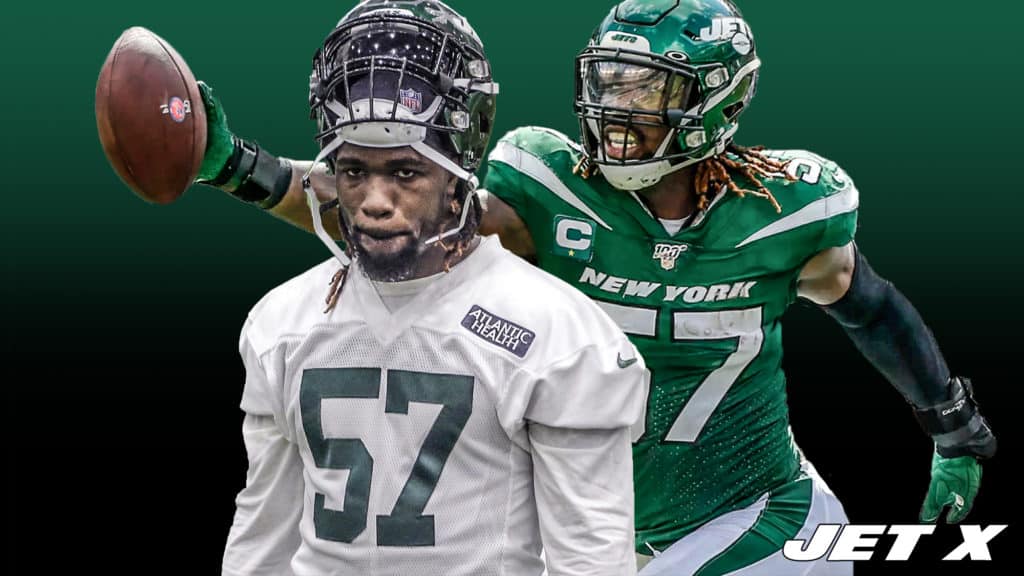C.J. Mosley missing the 2020 season is a big deal on the field, but his contractual situation is what’s a killer for the New York Jets.
Mr. Coffee strikes again. One final gift from the coffee-drinking general manager has been indirectly handed over to the New York Jets organization. And while Joe Douglas would prefer it to be an expresso machine or hell, even a simple $20 thermos, this present is a costly one.
Mike Maccagnan’s veteran free-agent splash a year ago has directly put the clamps on a salary-cap strategy that Douglas views as value-driven and timely. It’s also indirectly hurt the Jets’ plans during these uncertain times.
C.J. Mosley’s opt-out greatly hurts the Jets’ chances on the field in 2020, but, more importantly, it’s a contractual killer.
As first reported by ESPN’s Rich Cimini Saturday, Mosley had decided to opt-out of the 2020 season, citing family health concerns.
BREAKING: Jets LB CJ Mosley has decided to opt out for 2020 due to family health concerns, sources tell ESPN. #Jets
— Rich Cimini (@RichCimini) August 1, 2020
Per the agreed-upon guidelines, Mosley’s contract now skips a season. His five-year, $85 million deal initially scheduled to expire following the 2023 season will now be pushed a full campaign (through 2024). Instead of year three featuring a 29-year-old inside backer, the number moves to 30. Instead of year five showcasing a 31-year-old middle-of-the-defense leader, a 32-year-old will round out the richest linebacker pact in the NFL.
This is, obviously, terrible news.
Mosley, 28, is already nearing his age-30 season, and similar to running back, inside linebackers do not age well in this league—especially guys who rely on sideline-to-sideline speed.
No matter Mosley’s production, burning through that contract as quickly as possible represents the smarter, much more efficient strategy.
Players who opt-out will receive a $150,000 advance against their 2020 base salary, and their contract will freeze for the season. (Raking in a $350,000 stipend is also a possibility if the player is considered a higher risk medically, but for the sake of sanity, we’ll operate based on the $150,000 number.)
He will receive any roster bonus owed to him this year (as regularly-scheduled) in addition to the $150,000 advance. In 2021, the second year of his five-year pact kicks in. Considering his roster bonus totals $10 million this season, the Jets’ savings become evident.
Instead of a $17.5 million cap hit in 2020, it will now be $10 million, per Over The Cap. In 2021, his cap hit will total $7.5 million or $7.35 million (depending on the $150,000 or $350,000 base-salary advance this season for opting out).
Originally, Mosley’s cap hit in each season (2020 and 2021) was scheduled to run at $17.5 million. So the Jets will save $7.5 million in 2020 and roughly $10 million in 2021.
At this point, in early August, the $7.5 million in savings this season means very little. After the big-time free-agent dust settles in March, cap room from that point until the season is more about the following campaign. The $10 million number in 2021, however, is what has some onlookers thinking the Jets caught a break with the Mosley opt-out. Having more money to spend on free agents in March of 2021 is a good thing, right?
In a way, sure, but it’s not worth prolonging this brutal contract at a devalued NFL position.
Bobby Wagner, 30, is a rare breed. The man is still playing at a league-best level despite his age, which makes his four-year, $54 million deal signed prior to the 2019 season worthwhile. Besides, Seattle is on the hook only through the 2022 campaign. If Wagner’s production suddenly falls off the face of the Earth, the Seahawks would save $9.65 million if they cut him next offseason and another $16.6 million the following season.
The first opportunity to save money against the Mosley contract via a veteran cut will now not yet come until the 2022 offseason. If the opt-out never happened, the Jets would have had the ability to save money while cutting Mosley after the 2020 season.
The risk is far too great to think this scenario is a break. Age does not discriminate. Some players can play longer than others while some mysteriously fall flat at any given moment.
Additionally, remember, this man endured a serious injury last season. I already wrote about the seriousness of the matter earlier in the offseason. A run-of-the-mill groin pull is usually no problem. A little ice and rest eventually do the trick.
This was anything but a regular groin issue.
Mosley’s groin was so bad that surgery was required on top of a serious hip injury he sustained while at Alabama (2012). To bank on the man’s return after such an injury would be foolish. To even dare think about a return to normalcy after two-straight missed seasons is completely outrageous.
This is football. Repetition and competition is king, and Mosley’s absence for two-straight seasons puts his career firmly on the line. Ask anybody who’s missed two years of football and played collegiately or professionally; to return the same player is a near-impossible task—again, especially for a player who relies on quickness, as Mosley does. And especially for a guy who’ll be 29.
The risk-reward ratio just isn’t there to proclaim the minimal cap savings work as a positive. Besides, New York is already set up with a tidy cap space number of $58.4 million for the 2021 offseason.
The $10 million in cap savings in 2021 basically just offset what could have been saved if the Jets had the option to cut Mosley after the 2020 season while saving money ($5 million), and then another $15.5 million in savings after the 2021 campaign, and finally, $17 million after 2022. Now, those opportunities do not begin until a year later thanks to the opt-out. It’s a tradeoff that provides far more risk than it does short-term reward.
Not all situations are created equal, of course. A Sam Darnold-like situation is an example of an opt-out that would allow the Jets to catch a break. Still relatively cheap and still extremely young, freezing his deal and extending control would benefit Douglas’ plans greatly.
Value is the name of the game, and no matter how well Mosley might play in 2021, burning through that deal as quickly as possible—which would allow the earlier option to cut him if things go wrong—was the ideal scenario.
Now, there is no option. Mosley must be a stud during his age-29 season after missing two straight years of football. I’m no betting man, but the odds are greatly stacked against Mr. Coffee’s final (unwanted) indirect and cap-poisonous gift.







